1 Samuel 7 meaning explained in AI Summary
This chapter marks a turning point for Israel. After years of oppression under the Philistines and the tragic loss of the Ark of the Covenant, the Israelites experience repentance, renewal, and victory under the leadership of Samuel.
Here's a breakdown of the key events:
1. Repentance and Return to God (vv. 1-4):
- The Ark, having been returned by the Philistines, rests in Kiriath Jearim.
- Samuel calls on the Israelites to turn away from their foreign gods (Baals and Ashtaroth) and fully commit to the Lord.
- The people respond positively, putting away their idols and worshipping only the Lord.
2. Victory at Mizpah (vv. 5-14):
- The Philistines hear of the Israelites gathering at Mizpah and see it as a threat.
- The Israelites are afraid but Samuel intercedes for them, offering a sacrifice and praying to the Lord.
- As Samuel is sacrificing, the Philistines attack. The Lord answers Samuel's prayer by sending a thunderstorm that throws the Philistine army into confusion.
- The Israelites, empowered by God, defeat the Philistines, pursuing them to a point beyond Beth Car.
- This victory marks the end of Philistine oppression that had plagued Israel since the days of Samson.
3. Samuel's Leadership and Legacy (vv. 15-17):
- Samuel establishes a pattern of traveling to Bethel, Gilgal, and Mizpah, acting as judge and spiritual leader for Israel.
- He successfully maintains peace with the Philistines for the rest of his days.
Key Themes:
- Repentance and Renewal: The chapter emphasizes the importance of turning away from sin and returning to God for forgiveness and restoration.
- God's Power and Faithfulness: The victory at Mizpah highlights God's power to deliver his people when they call upon him in faith and obedience.
- Leadership and Justice: Samuel's leadership exemplifies the qualities of a righteous judge who guides the people spiritually and ensures justice in the land.
This chapter sets the stage for the establishment of the monarchy in Israel, as the people will later desire a king like other nations, despite Samuel's warnings. However, the victory at Mizpah serves as a powerful reminder of God's faithfulness and the importance of seeking his guidance and protection.
1 Samuel 7 bible study ai commentary
The central theme of 1 Samuel 7 is that national deliverance and restoration are the direct results of genuine repentance and wholehearted return to Yahweh. Israel’s previous attempts to manipulate God through religious objects failed catastrophically. Here, under Samuel’s prophetic leadership, the people abandon idolatry, confess their sin, and cry out to God, who responds with a miraculous victory, demonstrating that true power lies in a right relationship with Him, not in human strength or religious ritual.
1 Samuel 7 context
Following the capture of the Ark of the Covenant, Israel endured a twenty-year period of Philistine domination. The Philistines, a technologically superior people (possessing iron weaponry), controlled key territories and oppressed the Israelites. Culturally, Israel had sunk into religious syncretism, worshipping the Canaanite deities Baal (the storm and fertility god) and the Ashtaroth (goddesses of war and fertility) alongside Yahweh. This chapter marks a critical turning point, moving from the corrupt and failed priesthood of Eli's house to the faithful leadership of Samuel, who functions as prophet, priest, and judge, uniting the nation under God.
1 Samuel 7:1
And the men of Kiriath-jearim came and took up the ark of the LORD and brought it to the house of Abinadab on the hill. And they consecrated his son, Eleazar, to have charge of the ark of the LORD.
In-depth-analysis
- Kiriath-jearim: A Gibeonite city (Josh 9:17), now entrusted with Israel’s most sacred object. This highlights the disarray of the official Levitical system centered at Shiloh, which was likely destroyed (Ps 78:60-64, Jer 7:12-14).
- House of Abinadab: A private Levite's home becomes the temporary sanctuary for the Ark. It is situated "on the hill," signifying a place of prominence and honor.
- Consecrated Eleazar: The verb for "consecrated" (qādash) means to set apart for a holy purpose. This was a necessary, practical step, as the Ark required a guardian. However, it was an irregular appointment outside the formal Aaronic priestly structure, further emphasizing the breakdown of the established order.
Bible references
- 2 Samuel 6:3-4: "And they carried the ark of God... from the house of Abinadab, which was on the hill..." (Shows the Ark remained here for decades until David moved it).
- Numbers 4:15: "And when Aaron and his sons have finished covering the sanctuary... the sons of Kohath shall come to carry it..." (Details the specific Levites (Kohathites) meant to handle the Ark, a rule not followed here, showing the desperation of the times).
Cross references
Josh 9:17 (Kiriath-jearim's origin); 1 Chr 13:5-7 (David retrieves Ark from here); Ps 132:6 (Recalls finding the Ark in "the fields of Jaar," a poetic name for Kiriath-jearim).
1 Samuel 7:2
From the day that the ark was lodged at Kiriath-jearim, a long time passed, some twenty years, and all the house of Israel lamented after the LORD.
In-depth-analysis
- Twenty years: This extended period signifies a generation of oppression and spiritual lethargy. The divine presence, symbolized by the Ark, was separated from the people and the tabernacle.
- Lamented after the LORD: The Hebrew word nāhāh suggests a wailing or deep mourning. After two decades of hardship and divine silence, Israel finally begins to yearn for a true relationship with God, not just for the return of a symbolic object. Their distress created a spiritual hunger.
Bible references
- Judges 2:18: "Whenever the LORD raised up judges for them, the LORD was with the judge, and he saved them... for the LORD was moved to pity by their groaning..." (Pattern of oppression leading to crying out to God).
- Hosea 5:15: "I will return again to my place, until they acknowledge their guilt and seek my face, and in their affliction they will earnestly seek me." (God's withdrawal to provoke repentance).
Cross references
Ps 78:59-64 (The consequences of abandoning God); Lam 1:1-2 (The sorrow of a people under judgment); Acts 7:51 (Stiff-necked resistance to God).
1 Samuel 7:3-4
And Samuel said to all the house of Israel, “If you are returning to the LORD with all your heart, then put away the foreign gods and the Ashtaroth from among you and direct your heart to the LORD and serve him only, and he will deliver you out of the hand of the Philistines.” So the people of Israel put away the Baals and the Ashtaroth, and they served the LORD only.
In-depth-analysis
- Returning... with all your heart: The Hebrew verb for return (šûḇ) is the foundational word for repentance. Samuel demands an authentic, internal turning, not just an outward ritual. It must be "with all your heart," signifying total commitment.
- Put away the foreign gods: This is the necessary evidence of true repentance. They cannot serve God while holding onto idols. Baal (male deity) and Ashtaroth (female consort) were central to Canaanite fertility cults.
- Serve him only: Samuel preaches uncompromising monotheism. Deliverance is conditional upon exclusive loyalty to Yahweh.
- The people... put away: For the first time in a long while, the people respond with collective obedience. This action demonstrates their repentance is genuine.
Bible references
- Deuteronomy 6:4-5: "Hear, O Israel: The LORD our God, the LORD is one. You shall love the LORD your God with all your heart..." (The core command Samuel is reinstating).
- Matthew 6:24: "No one can serve two masters..." (Echoes Samuel's call for exclusive service).
- Joel 2:12-13: "‘Yet even now,’ declares the LORD, ‘return to me with all your heart... Rend your heart and not your garments.’" (Emphasizes the need for inner repentance over outward shows).
Cross references
Josh 24:14-15 (Joshua's similar call to put away idols); Judg 10:15-16 (Previous repentance and removal of idols); 2 Chr 34:3-7 (Josiah's reforms); Acts 26:20 (Repenting and turning to God).
Polemics
This is a direct polemic against Canaanite religion. Israel’s deliverance will not come from Baal, the supposed god of storms, or Ashtaroth, the goddess of war. In a powerful irony, Yahweh will use a storm (v. 10) to defeat the Philistines, demonstrating He alone holds power over creation and victory in battle.
1 Samuel 7:5-6
Then Samuel said, “Gather all Israel at Mizpah, and I will pray to the LORD for you.” So they gathered at Mizpah and drew water and poured it out before the LORD and fasted on that day and said there, “We have sinned against the LORD.” And Samuel judged Israel at Mizpah.
In-depth-analysis
- Mizpah: Meaning "watchtower" or "lookout point." It was a traditional place for solemn gatherings and covenant-making (Gen 31:49, Judg 20:1).
- I will pray... for you: Samuel positions himself as a mediator and intercessor between God and Israel, a key prophetic and priestly role.
- Drew water and poured it out: This symbolic act is unique. Interpretations include:
- Repentance/Humility: Symbolizing their hearts being poured out in confession (Lam 2:19).
- Helplessness: A sign of their lives being as weak and vulnerable as spilled water (Ps 22:14).
- Libation/Covenant: An oath-sealing rite or drink offering to solemnize their commitment.
- We have sinned against the LORD: A clear, corporate confession of guilt. This is the verbalization of their repentance.
- Samuel judged Israel: "Judged" (shāphat) here means more than settling disputes; it implies overall leadership, guidance, and restoration of order according to God’s law.
Bible references
- Lamentations 2:19: "Arise, cry out... pour out your heart like water before the presence of the Lord!" (Water as a symbol of a poured-out heart).
- Psalm 62:8: "Trust in him at all times, O people; pour out your heart before him..." (Metaphor for prayer).
- Nehemiah 9:1-2: "The people of Israel were assembled with fasting... and they stood and confessed their sins..." (A later example of a similar national confession).
Cross references
Gen 31:49 (First mention of Mizpah); Judg 20:1 (All Israel gathers at Mizpah); 2 Chr 20:3-4 (Jehoshaphat proclaims a fast); Dan 9:3-5 (Daniel's confession).
1 Samuel 7:7-8
Now when the Philistines heard that the people of Israel had gathered at Mizpah, the lords of the Philistines went up against Israel. And when the people of Israel heard of it, they were afraid and said to Samuel, “Do not cease to cry out to the LORD our God for us, that he may save us from the hand of the Philistines.”
In-depth-analysis
- The Philistines went up against Israel: The enemy attacks at the moment of Israel's greatest vulnerability—they are unarmed and engaged in a religious ceremony. This sets the stage for a divine test.
- They were afraid: Their fear is natural, but their response is new. They do not run, appoint a general, or reach for an idol.
- Do not cease to cry out to the LORD: Instead of relying on a physical object like the Ark, they now rely on a person's intercession. They have learned that access to God is through prayer and a righteous mediator, not a magic box.
Bible references
- Exodus 14:10: "And when the Israelites saw the Egyptians marching after them, they were terrified and cried out to the LORD." (A similar pattern of fear leading to a cry for divine help).
- 2 Chronicles 20:12: "O our God... We do not know what to do, but our eyes are on you." (The posture of complete dependence that Israel now exhibits).
- James 5:16: "...The prayer of a righteous person has great power as it is working." (Validates Israel's trust in Samuel's intercession).
Cross references
Heb 4:16 (Approaching the throne of grace); Phil 4:6-7 (Prayer in anxiety); 1 Pet 5:7 (Casting anxieties on God).
1 Samuel 7:9-11
So Samuel took a suckling lamb and offered it as a whole burnt offering to the LORD. And Samuel cried out to the LORD for Israel, and the LORD answered him. As Samuel was offering up the burnt offering, the Philistines drew near to attack Israel. But the LORD thundered with a mighty sound that day against the Philistines and threw them into confusion, and they were defeated before Israel. And the men of Israel went out from Mizpah and pursued the Philistines and struck them down as far as below Beth-car.
In-depth-analysis
- Suckling lamb: A young, unblemished animal, symbolizing innocence and representing a total offering. This sacrifice, though performed by Samuel (a Levite, not an Aaronic priest), was accepted by God.
- The LORD answered him: A direct affirmation of Samuel's role and the efficacy of his prayer and sacrifice.
- The LORD thundered with a mighty sound (qôl gādôl): This is a theophany—a direct divine intervention. The God of creation uses thunder, a weapon Baal was supposed to control, to fight for Israel. It causes confusion (hāmam), a panic sent from God.
- They were defeated before Israel: God wins the battle; Israel's role is simply to pursue the already-routed enemy. It is a victory of faith, not military might.
Bible references
- Psalm 18:13-14: "The LORD also thundered in the heavens... And he sent out his arrows and scattered them; he flashed forth lightnings and routed them." (David describes God's power in battle using the same imagery).
- Joshua 10:10-11: "And the LORD threw them into a panic... and the LORD threw down large stones from heaven on them..." (Another example of God fighting directly for Israel with natural phenomena).
- Hebrews 7:25: "Consequently, he [Jesus] is able to save to the uttermost those who draw near to God through him, since he always lives to make intercession for them." (Samuel's intercession is a type of Christ's perfect intercession).
Cross references
Judg 4:15 (The LORD routs Sisera); Ps 29:3-4 (The voice of the LORD in power); Isa 30:30-31 (The LORD's voice strikes down Assyria); Rev 16:18 (Thunders and lightning associated with final judgment).
1 Samuel 7:12
Then Samuel took a stone and set it up between Mizpah and Shen and called its name Ebenezer; for he said, “Till now the LORD has helped us.”
In-depth-analysis
- Samuel took a stone: Memorial stones were common in the ancient world to commemorate significant events. This act creates a physical, lasting testimony to what God has done.
- Ebenezer (‘eben hā-‘āzer): Literally "stone of the help." The name gives all credit for the victory to God.
- Till now the LORD has helped us: This phrase looks both backward in gratitude for past deliverance and forward in hope for future help. It anchors Israel’s faith in a specific, historical act of God, a direct contrast to the superstitious faith they placed in the Ark in chapter 4. The earlier battle at Aphek, near the future site of Ebenezer, ended in defeat. Now, at the same location, there is victory, redeeming the place.
Bible references
- Genesis 28:18-19: "Jacob... took the stone that he had put under his head and set it up for a pillar... he called the name of that place Bethel..." (Memorializing a divine encounter).
- Joshua 4:6-7: "...These stones shall be for a memorial to the people of Israel forever." (The stones from the Jordan memorializing God's power).
- Acts 26:22: "To this day I have had the help that comes from God..." (Paul's testimony, echoing the sentiment of Ebenezer).
Cross references
Gen 31:45-52 (Stone of witness); Exod 17:15 (Altar named "The LORD is my Banner"); 1 Sam 4:1 (Site of previous defeat, now redeemed).
1 Samuel 7:13-14
So the Philistines were subdued and did not again enter the territory of Israel. And the hand of the LORD was against the Philistines all the days of Samuel. The cities that the Philistines had taken from Israel were restored to Israel, from Ekron to Gath, and Israel delivered their territory from the hand of the Philistines. There was also peace between Israel and the Amorites.
In-depth-analysis
- Philistines were subdued: The victory was decisive, bringing a long period of relief and reversing the power dynamic.
- All the days of Samuel: This phrase emphasizes the lasting impact of the spiritual revival. The peace and security were tied directly to the period of Samuel's faithful leadership.
- Cities... were restored: The tangible fruit of repentance and God's intervention was the restoration of lost land and sovereignty.
- Peace between Israel and the Amorites: The "Amorites" is used here as a general term for the pre-Israelite Canaanite inhabitants. God’s blessing brings not only victory over enemies but also peace with neighbors.
Bible references
- Judges 2:18-19: "...The LORD was moved to pity... But whenever the judge died, they turned back and were more corrupt than their fathers..." (Shows that peace was often tied to the life of a faithful judge).
- 1 Kings 4:24-25: "And he [Solomon] had peace on all sides... And Judah and Israel lived in safety..." (The ultimate fulfillment of this blessing during a time of national obedience).
Cross references
Judg 3:11, 30 (Land had rest); 1 Sam 13:5 (Philistines return after Samuel's authority is challenged); 2 Chr 15:19 (No more war during Asa's obedient reign).
1 Samuel 7:15-17
Samuel judged Israel all the days of his life. And he went on a circuit year by year to Bethel, Gilgal, and Mizpah. And he judged Israel in all these places. Then he would return to Ramah, for his home was there, and there also he judged Israel. And he built there an altar to the LORD.
In-depth-analysis
- Samuel judged Israel all the days of his life: Samuel provides stable, lifelong leadership, unlike the episodic judges before him.
- Circuit... to Bethel, Gilgal, and Mizpah: He established a system of justice and governance, traveling to key historic and religious centers.
- Bethel: "House of God," sacred to Jacob.
- Gilgal: Israel's first camp in the promised land, a place of covenant renewal.
- Mizpah: The site of the recent national revival.
- Return to Ramah: His hometown became his base of operations.
- He built there an altar to the LORD: With the official sanctuary in ruins, Samuel decentralizes worship but keeps it central to his life and leadership. Building an altar is an act of acknowledging God as the ultimate source of his authority and Israel's well-being. This was irregular (cf. Deut 12), but necessary in a time of national disarray.
Bible references
- Deuteronomy 16:18: "You shall appoint judges and officers in all your towns..." (Samuel is fulfilling this command).
- Exodus 18:25-26: "Moses chose able men out of all Israel and made them heads over the people... And they judged the people at all times..." (Samuel mirrors the judicial model of Moses).
- Judges 21:4: "And on the next day the people... built there an altar and offered burnt offerings..." (Altars built at specific times of need or recommitment).
Cross references
Deut 12:5, 13-14 (Command for central worship, showing this was an exceptional time); 1 Sam 1:1 (Ramah as Samuel's birthplace).
1 Samuel chapter 7 analysis
- Samuel as a Type of Christ: Samuel functions in a three-fold office that anticipates Jesus Christ.
- Prophet: He speaks God's word to the people (v. 3).
- Priest: He offers a sacrifice and intercedes for the people (v. 9).
- Judge (King): He governs and leads Israel, bringing peace and justice (v. 15-17).
- Repentance as the Key to Revival: The chapter presents a clear formula: identification of sin (idolatry), a call to repentance (put them away), a symbolic act of commitment (Mizpah), confession, and intercession. This leads directly to divine intervention and restoration.
- Faith vs. Superstition: This chapter stands in stark contrast to chapter 4. In chapter 4, Israel trusted a religious object (the Ark) and was defeated. In chapter 7, they trust God through prayer and obedience and are victorious. The Ebenezer stone is not a magical object but a memorial of what God has done.
- Theophany in Battle: The use of thunder is significant. It is Yahweh demonstrating His superiority over the Philistine gods and the Canaanite Baal, the so-called "god of the storm." God uses the very thing Baal was supposed to control to defeat His enemies.
1 Samuel 7 summary
After twenty years of oppression, the prophet Samuel calls Israel to national repentance at Mizpah. They confess their sins and put away their idols, turning to serve God exclusively. When the Philistines attack this vulnerable gathering, Samuel intercedes, and God fights for Israel with a mighty thunder, routing the enemy. Samuel erects a memorial stone, "Ebenezer" (Stone of Help), to commemorate God's deliverance. The victory secures lasting peace and restores lost territory, establishing Samuel's lifelong leadership as Israel's judge.
1 Samuel 7 AI Image Audio and Video
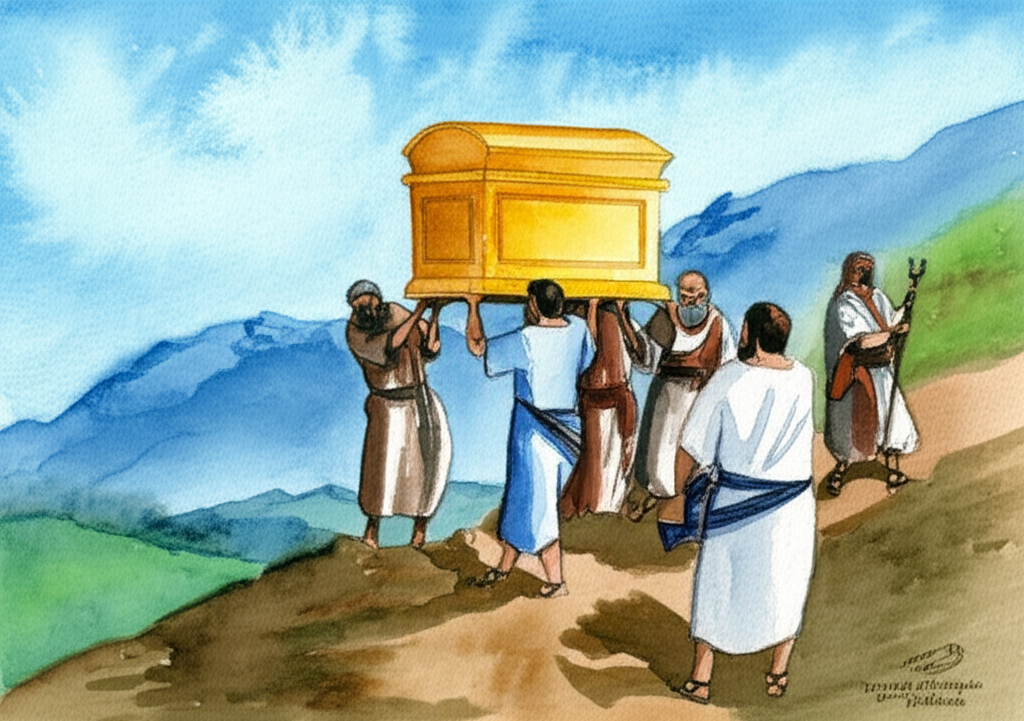
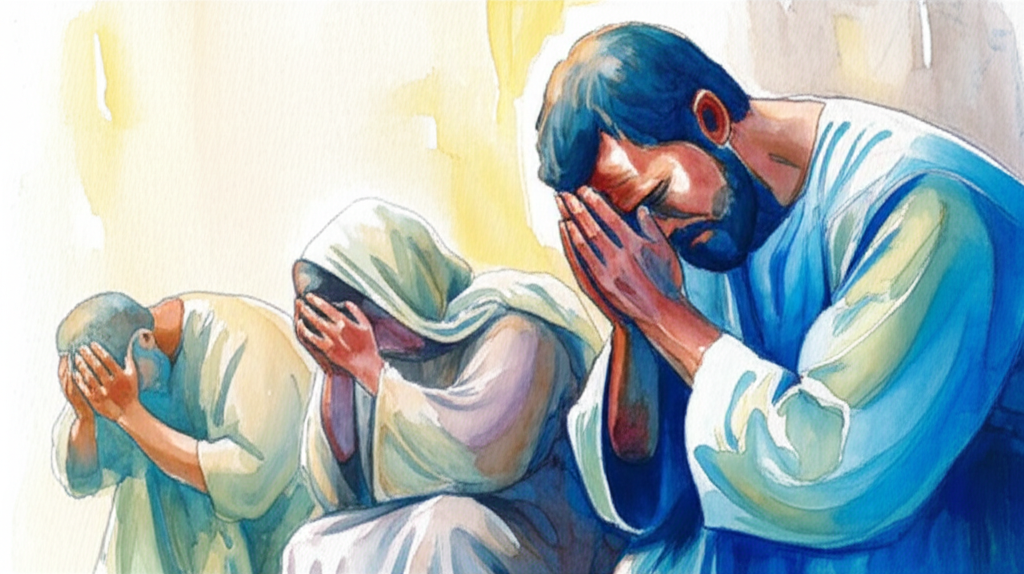
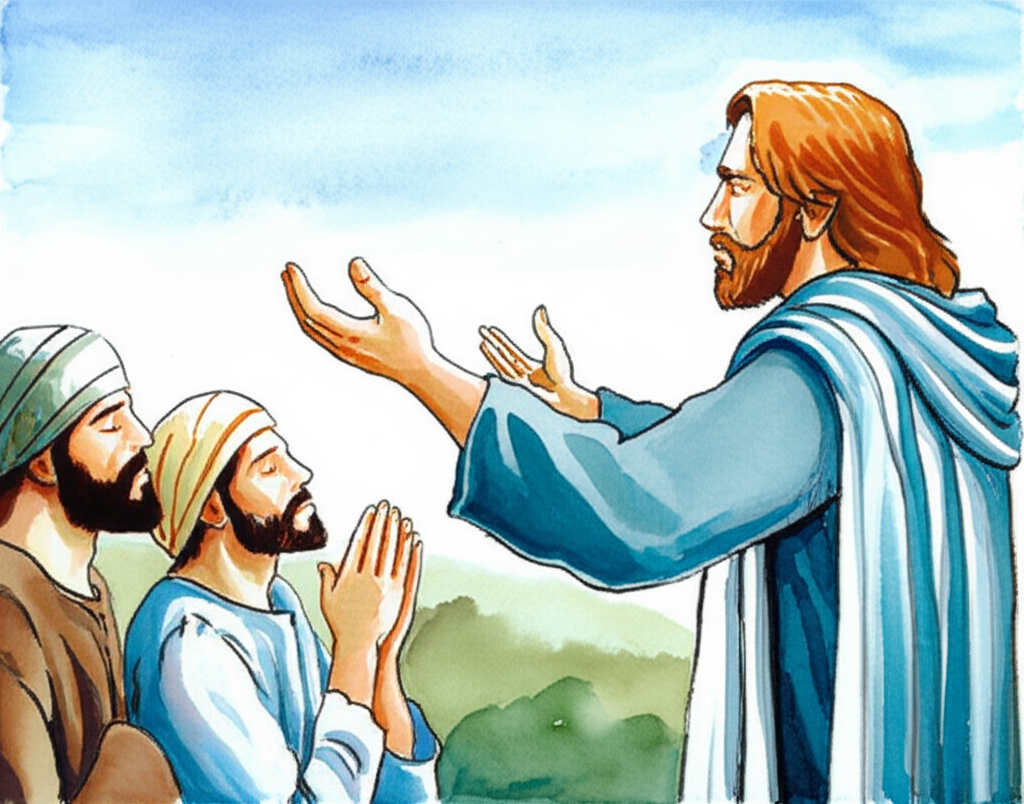
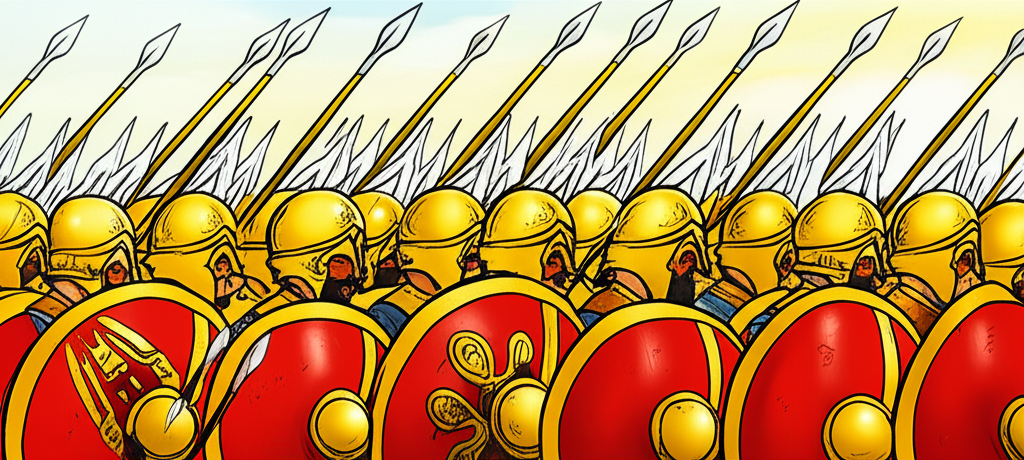
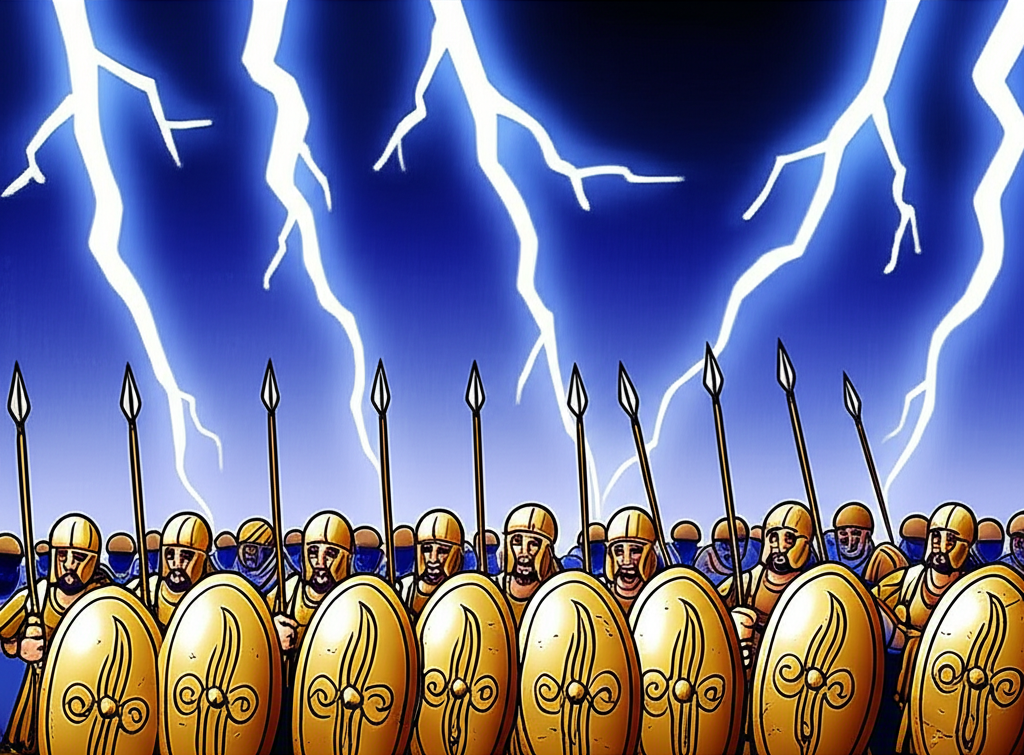

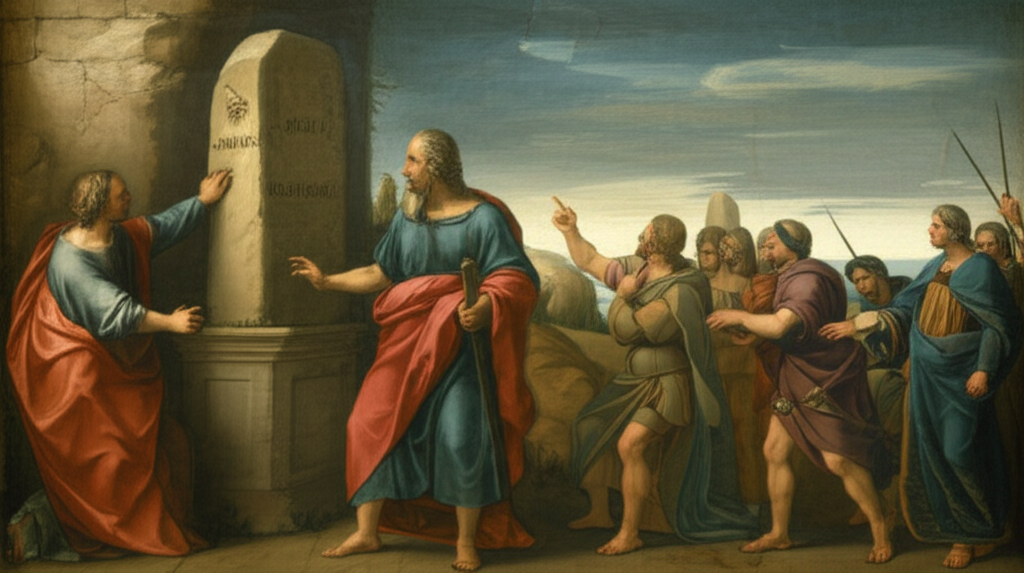
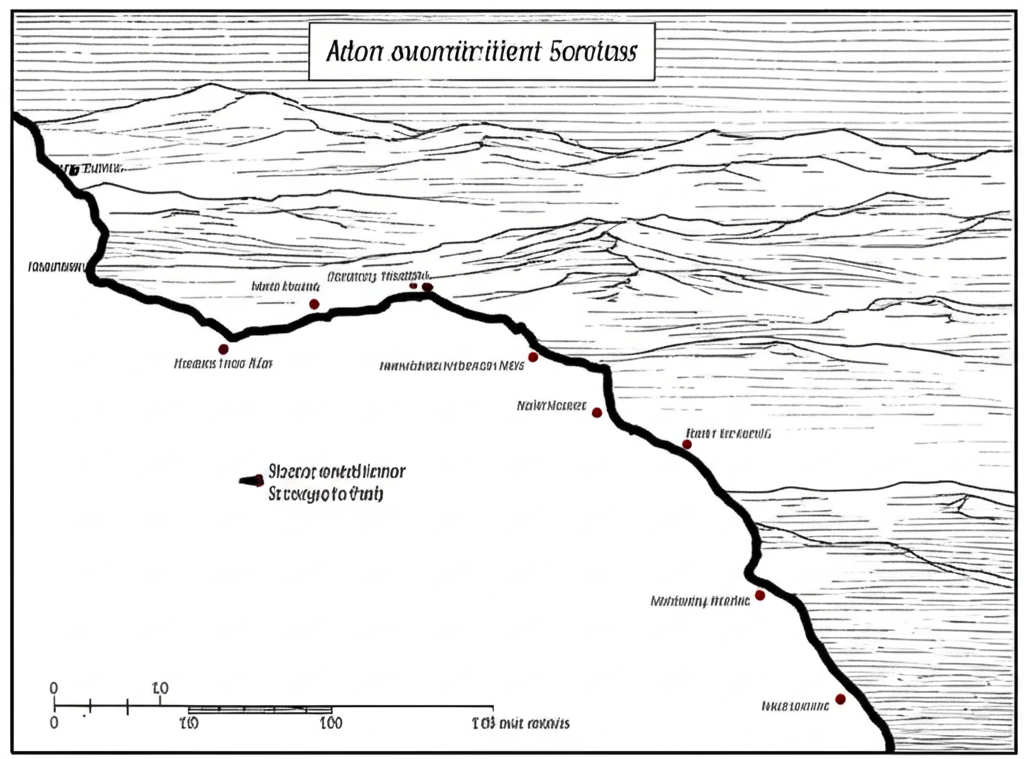
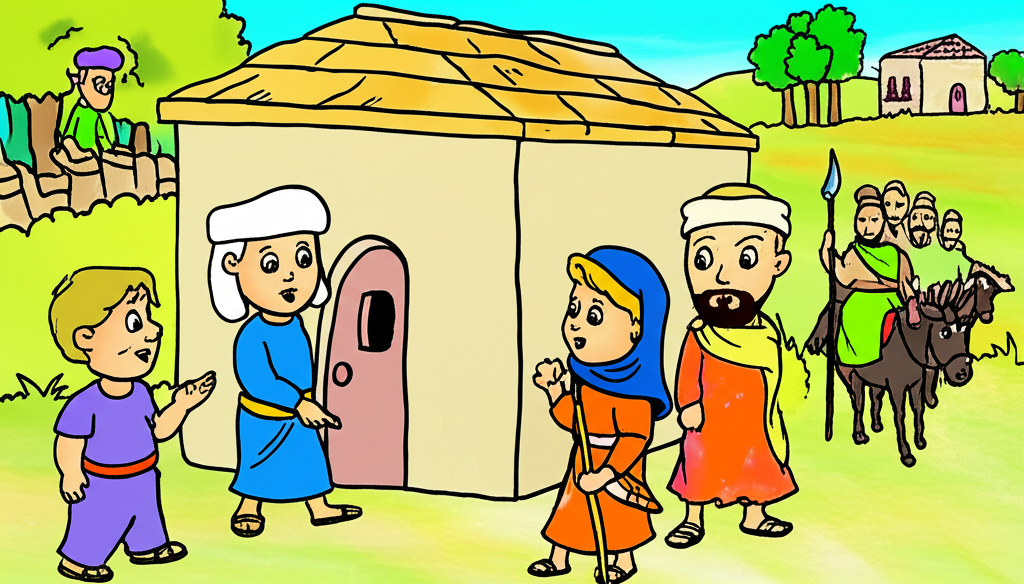
1 Samuel chapter 7 kjv
- 1 And the men of Kirjathjearim came, and fetched up the ark of the LORD, and brought it into the house of Abinadab in the hill, and sanctified Eleazar his son to keep the ark of the LORD.
- 2 And it came to pass, while the ark abode in Kirjathjearim, that the time was long; for it was twenty years: and all the house of Israel lamented after the LORD.
- 3 And Samuel spake unto all the house of Israel, saying, If ye do return unto the LORD with all your hearts, then put away the strange gods and Ashtaroth from among you, and prepare your hearts unto the LORD, and serve him only: and he will deliver you out of the hand of the Philistines.
- 4 Then the children of Israel did put away Baalim and Ashtaroth, and served the LORD only.
- 5 And Samuel said, Gather all Israel to Mizpeh, and I will pray for you unto the LORD.
- 6 And they gathered together to Mizpeh, and drew water, and poured it out before the LORD, and fasted on that day, and said there, We have sinned against the LORD. And Samuel judged the children of Israel in Mizpeh.
- 7 And when the Philistines heard that the children of Israel were gathered together to Mizpeh, the lords of the Philistines went up against Israel. And when the children of Israel heard it, they were afraid of the Philistines.
- 8 And the children of Israel said to Samuel, Cease not to cry unto the LORD our God for us, that he will save us out of the hand of the Philistines.
- 9 And Samuel took a sucking lamb, and offered it for a burnt offering wholly unto the LORD: and Samuel cried unto the LORD for Israel; and the LORD heard him.
- 10 And as Samuel was offering up the burnt offering, the Philistines drew near to battle against Israel: but the LORD thundered with a great thunder on that day upon the Philistines, and discomfited them; and they were smitten before Israel.
- 11 And the men of Israel went out of Mizpeh, and pursued the Philistines, and smote them, until they came under Bethcar.
- 12 Then Samuel took a stone, and set it between Mizpeh and Shen, and called the name of it Ebenezer, saying, Hitherto hath the LORD helped us.
- 13 So the Philistines were subdued, and they came no more into the coast of Israel: and the hand of the LORD was against the Philistines all the days of Samuel.
- 14 And the cities which the Philistines had taken from Israel were restored to Israel, from Ekron even unto Gath; and the coasts thereof did Israel deliver out of the hands of the Philistines. And there was peace between Israel and the Amorites.
- 15 And Samuel judged Israel all the days of his life.
- 16 And he went from year to year in circuit to Bethel, and Gilgal, and Mizpeh, and judged Israel in all those places.
- 17 And his return was to Ramah; for there was his house; and there he judged Israel; and there he built an altar unto the LORD.
1 Samuel chapter 7 nkjv
- 1 Then the men of Kirjath Jearim came and took the ark of the LORD, and brought it into the house of Abinadab on the hill, and consecrated Eleazar his son to keep the ark of the LORD.
- 2 So it was that the ark remained in Kirjath Jearim a long time; it was there twenty years. And all the house of Israel lamented after the LORD.
- 3 Then Samuel spoke to all the house of Israel, saying, "If you return to the LORD with all your hearts, then put away the foreign gods and the Ashtoreths from among you, and prepare your hearts for the LORD, and serve Him only; and He will deliver you from the hand of the Philistines."
- 4 So the children of Israel put away the Baals and the Ashtoreths, and served the LORD only.
- 5 And Samuel said, "Gather all Israel to Mizpah, and I will pray to the LORD for you."
- 6 So they gathered together at Mizpah, drew water, and poured it out before the LORD. And they fasted that day, and said there, "We have sinned against the LORD." And Samuel judged the children of Israel at Mizpah.
- 7 Now when the Philistines heard that the children of Israel had gathered together at Mizpah, the lords of the Philistines went up against Israel. And when the children of Israel heard of it, they were afraid of the Philistines.
- 8 So the children of Israel said to Samuel, "Do not cease to cry out to the LORD our God for us, that He may save us from the hand of the Philistines."
- 9 And Samuel took a suckling lamb and offered it as a whole burnt offering to the LORD. Then Samuel cried out to the LORD for Israel, and the LORD answered him.
- 10 Now as Samuel was offering up the burnt offering, the Philistines drew near to battle against Israel. But the LORD thundered with a loud thunder upon the Philistines that day, and so confused them that they were overcome before Israel.
- 11 And the men of Israel went out of Mizpah and pursued the Philistines, and drove them back as far as below Beth Car.
- 12 Then Samuel took a stone and set it up between Mizpah and Shen, and called its name Ebenezer, saying, "Thus far the LORD has helped us."
- 13 So the Philistines were subdued, and they did not come anymore into the territory of Israel. And the hand of the LORD was against the Philistines all the days of Samuel.
- 14 Then the cities which the Philistines had taken from Israel were restored to Israel, from Ekron to Gath; and Israel recovered its territory from the hands of the Philistines. Also there was peace between Israel and the Amorites.
- 15 And Samuel judged Israel all the days of his life.
- 16 He went from year to year on a circuit to Bethel, Gilgal, and Mizpah, and judged Israel in all those places.
- 17 But he always returned to Ramah, for his home was there. There he judged Israel, and there he built an altar to the LORD.
1 Samuel chapter 7 niv
- 1 So the men of Kiriath Jearim came and took up the ark of the LORD. They brought it to Abinadab's house on the hill and consecrated Eleazar his son to guard the ark of the LORD.
- 2 The ark remained at Kiriath Jearim a long time?twenty years in all. Then all the people of Israel turned back to the LORD.
- 3 So Samuel said to all the Israelites, "If you are returning to the LORD with all your hearts, then rid yourselves of the foreign gods and the Ashtoreths and commit yourselves to the LORD and serve him only, and he will deliver you out of the hand of the Philistines."
- 4 So the Israelites put away their Baals and Ashtoreths, and served the LORD only.
- 5 Then Samuel said, "Assemble all Israel at Mizpah, and I will intercede with the LORD for you."
- 6 When they had assembled at Mizpah, they drew water and poured it out before the LORD. On that day they fasted and there they confessed, "We have sinned against the LORD." Now Samuel was serving as leader of Israel at Mizpah.
- 7 When the Philistines heard that Israel had assembled at Mizpah, the rulers of the Philistines came up to attack them. When the Israelites heard of it, they were afraid because of the Philistines.
- 8 They said to Samuel, "Do not stop crying out to the LORD our God for us, that he may rescue us from the hand of the Philistines."
- 9 Then Samuel took a suckling lamb and sacrificed it as a whole burnt offering to the LORD. He cried out to the LORD on Israel's behalf, and the LORD answered him.
- 10 While Samuel was sacrificing the burnt offering, the Philistines drew near to engage Israel in battle. But that day the LORD thundered with loud thunder against the Philistines and threw them into such a panic that they were routed before the Israelites.
- 11 The men of Israel rushed out of Mizpah and pursued the Philistines, slaughtering them along the way to a point below Beth Kar.
- 12 Then Samuel took a stone and set it up between Mizpah and Shen. He named it Ebenezer, saying, "Thus far the LORD has helped us."
- 13 So the Philistines were subdued and they stopped invading Israel's territory. Throughout Samuel's lifetime, the hand of the LORD was against the Philistines.
- 14 The towns from Ekron to Gath that the Philistines had captured from Israel were restored to Israel, and Israel delivered the neighboring territory from the hands of the Philistines. And there was peace between Israel and the Amorites.
- 15 Samuel continued as Israel's leader all the days of his life.
- 16 From year to year he went on a circuit from Bethel to Gilgal to Mizpah, judging Israel in all those places.
- 17 But he always went back to Ramah, where his home was, and there he also held court for Israel. And he built an altar there to the LORD.
1 Samuel chapter 7 esv
- 1 And the men of Kiriath-jearim came and took up the ark of the LORD and brought it to the house of Abinadab on the hill. And they consecrated his son Eleazar to have charge of the ark of the LORD.
- 2 From the day that the ark was lodged at Kiriath-jearim, a long time passed, some twenty years, and all the house of Israel lamented after the LORD.
- 3 And Samuel said to all the house of Israel, "If you are returning to the LORD with all your heart, then put away the foreign gods and the Ashtaroth from among you and direct your heart to the LORD and serve him only, and he will deliver you out of the hand of the Philistines."
- 4 So the people of Israel put away the Baals and the Ashtaroth, and they served the LORD only.
- 5 Then Samuel said, "Gather all Israel at Mizpah, and I will pray to the LORD for you."
- 6 So they gathered at Mizpah and drew water and poured it out before the LORD and fasted on that day and said there, "We have sinned against the LORD." And Samuel judged the people of Israel at Mizpah.
- 7 Now when the Philistines heard that the people of Israel had gathered at Mizpah, the lords of the Philistines went up against Israel. And when the people of Israel heard of it, they were afraid of the Philistines.
- 8 And the people of Israel said to Samuel, "Do not cease to cry out to the LORD our God for us, that he may save us from the hand of the Philistines."
- 9 So Samuel took a nursing lamb and offered it as a whole burnt offering to the LORD. And Samuel cried out to the LORD for Israel, and the LORD answered him.
- 10 As Samuel was offering up the burnt offering, the Philistines drew near to attack Israel. But the LORD thundered with a mighty sound that day against the Philistines and threw them into confusion, and they were defeated before Israel.
- 11 And the men of Israel went out from Mizpah and pursued the Philistines and struck them, as far as below Beth-car.
- 12 Then Samuel took a stone and set it up between Mizpah and Shen and called its name Ebenezer; for he said, "Till now the LORD has helped us."
- 13 So the Philistines were subdued and did not again enter the territory of Israel. And the hand of the LORD was against the Philistines all the days of Samuel.
- 14 The cities that the Philistines had taken from Israel were restored to Israel, from Ekron to Gath, and Israel delivered their territory from the hand of the Philistines. There was peace also between Israel and the Amorites.
- 15 Samuel judged Israel all the days of his life.
- 16 And he went on a circuit year by year to Bethel, Gilgal, and Mizpah. And he judged Israel in all these places.
- 17 Then he would return to Ramah, for his home was there, and there also he judged Israel. And he built there an altar to the LORD.
1 Samuel chapter 7 nlt
- 1 So the men of Kiriath-jearim came to get the Ark of the LORD. They took it to the hillside home of Abinadab and ordained Eleazar, his son, to be in charge of it.
- 2 The Ark remained in Kiriath-jearim for a long time ? twenty years in all. During that time all Israel mourned because it seemed the LORD had abandoned them.
- 3 Then Samuel said to all the people of Israel, "If you want to return to the LORD with all your hearts, get rid of your foreign gods and your images of Ashtoreth. Turn your hearts to the LORD and obey him alone; then he will rescue you from the Philistines."
- 4 So the Israelites got rid of their images of Baal and Ashtoreth and worshiped only the LORD.
- 5 Then Samuel told them, "Gather all of Israel to Mizpah, and I will pray to the LORD for you."
- 6 So they gathered at Mizpah and, in a great ceremony, drew water from a well and poured it out before the LORD. They also went without food all day and confessed that they had sinned against the LORD. (It was at Mizpah that Samuel became Israel's judge.)
- 7 When the Philistine rulers heard that Israel had gathered at Mizpah, they mobilized their army and advanced. The Israelites were badly frightened when they learned that the Philistines were approaching.
- 8 "Don't stop pleading with the LORD our God to save us from the Philistines!" they begged Samuel.
- 9 So Samuel took a young lamb and offered it to the LORD as a whole burnt offering. He pleaded with the LORD to help Israel, and the LORD answered him.
- 10 Just as Samuel was sacrificing the burnt offering, the Philistines arrived to attack Israel. But the LORD spoke with a mighty voice of thunder from heaven that day, and the Philistines were thrown into such confusion that the Israelites defeated them.
- 11 The men of Israel chased them from Mizpah to a place below Beth-car, slaughtering them all along the way.
- 12 Samuel then took a large stone and placed it between the towns of Mizpah and Jeshanah. He named it Ebenezer (which means "the stone of help"), for he said, "Up to this point the LORD has helped us!"
- 13 So the Philistines were subdued and didn't invade Israel again for some time. And throughout Samuel's lifetime, the LORD's powerful hand was raised against the Philistines.
- 14 The Israelite villages near Ekron and Gath that the Philistines had captured were restored to Israel, along with the rest of the territory that the Philistines had taken. And there was peace between Israel and the Amorites in those days.
- 15 Samuel continued as Israel's judge for the rest of his life.
- 16 Each year he traveled around, setting up his court first at Bethel, then at Gilgal, and then at Mizpah. He judged the people of Israel at each of these places.
- 17 Then he would return to his home at Ramah, and he would hear cases there, too. And Samuel built an altar to the LORD at Ramah.
- Bible Book of 1 Samuel
- 1 Story of Hannah
- 2 Hannah's song and Prayer
- 3 Story of Samuel
- 4 The Philistines Capture the Ark
- 5 The Philistines and the Ark
- 6 The Ark Returned to Israel
- 7 Samuel Judges Israel
- 8 Israel Asks for a King
- 9 Saul the first king of Israel
- 10 Samuel Anoints Saul as King
- 11 Saul Defeats the Ammonites
- 12 Samuel's Farewell Address
- 13 Saul Fights the Philistines
- 14 Story of Jonathan
- 15 Saul and the Amalekites
- 16 David annointed
- 17 David and Goliath story
- 18 David and Jonathan's Friendship
- 19 Saul Tries to Kill David
- 20 Jonathan Warns David
- 21 David and the Holy Bread
- 22 David in the cav of Adullam
- 23 David Saves the City of Keilah
- 24 David Spares Saul's Life
- 25 Death of Samuel and Abigail
- 26 David Spares Saul Again
- 27 David Flees to the Philistines
- 28 Saul consults the Witch of Endor
- 29 The Philistines Reject David
- 30 David's Wives Are Captured
- 31 Death of Saul